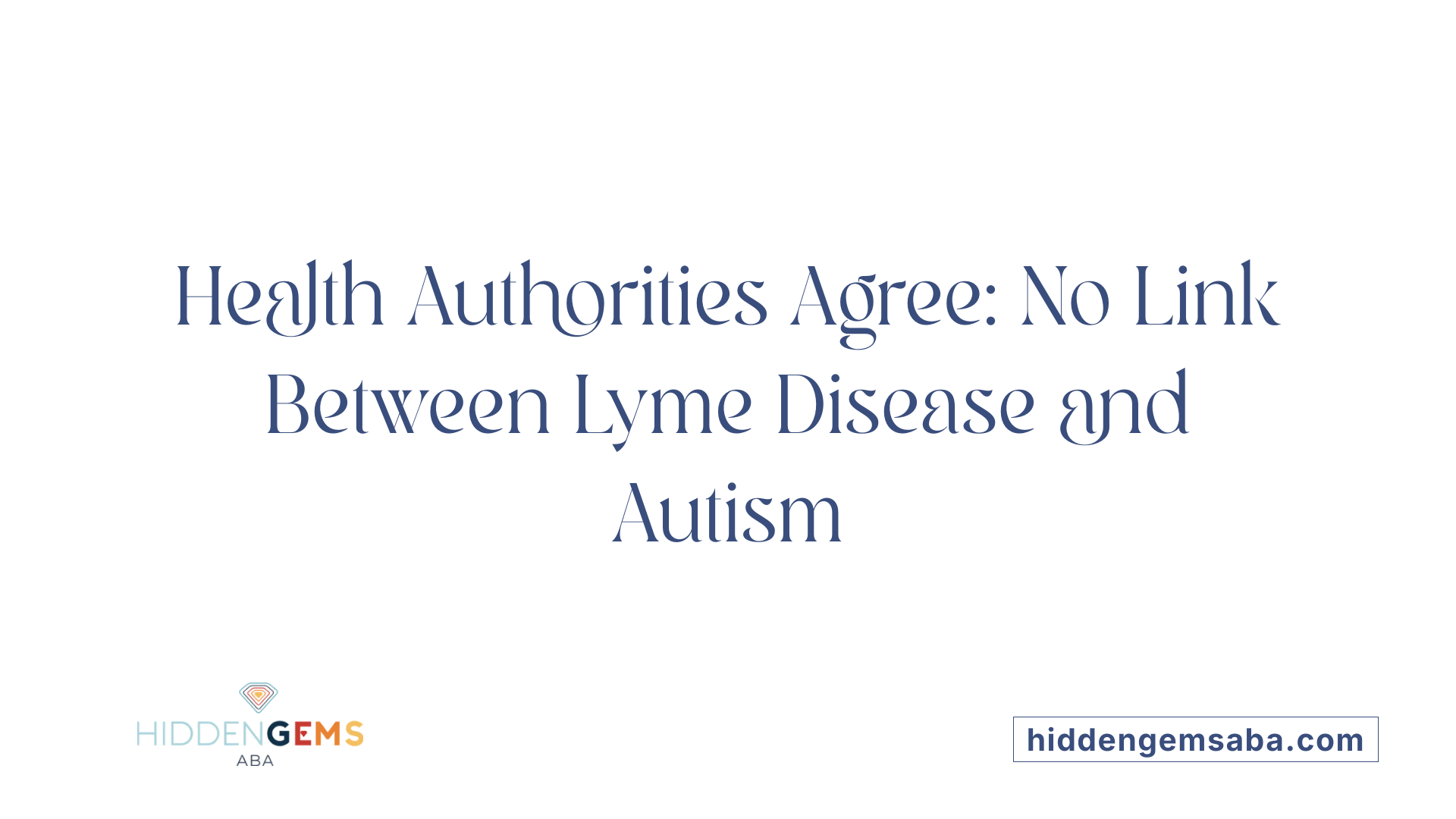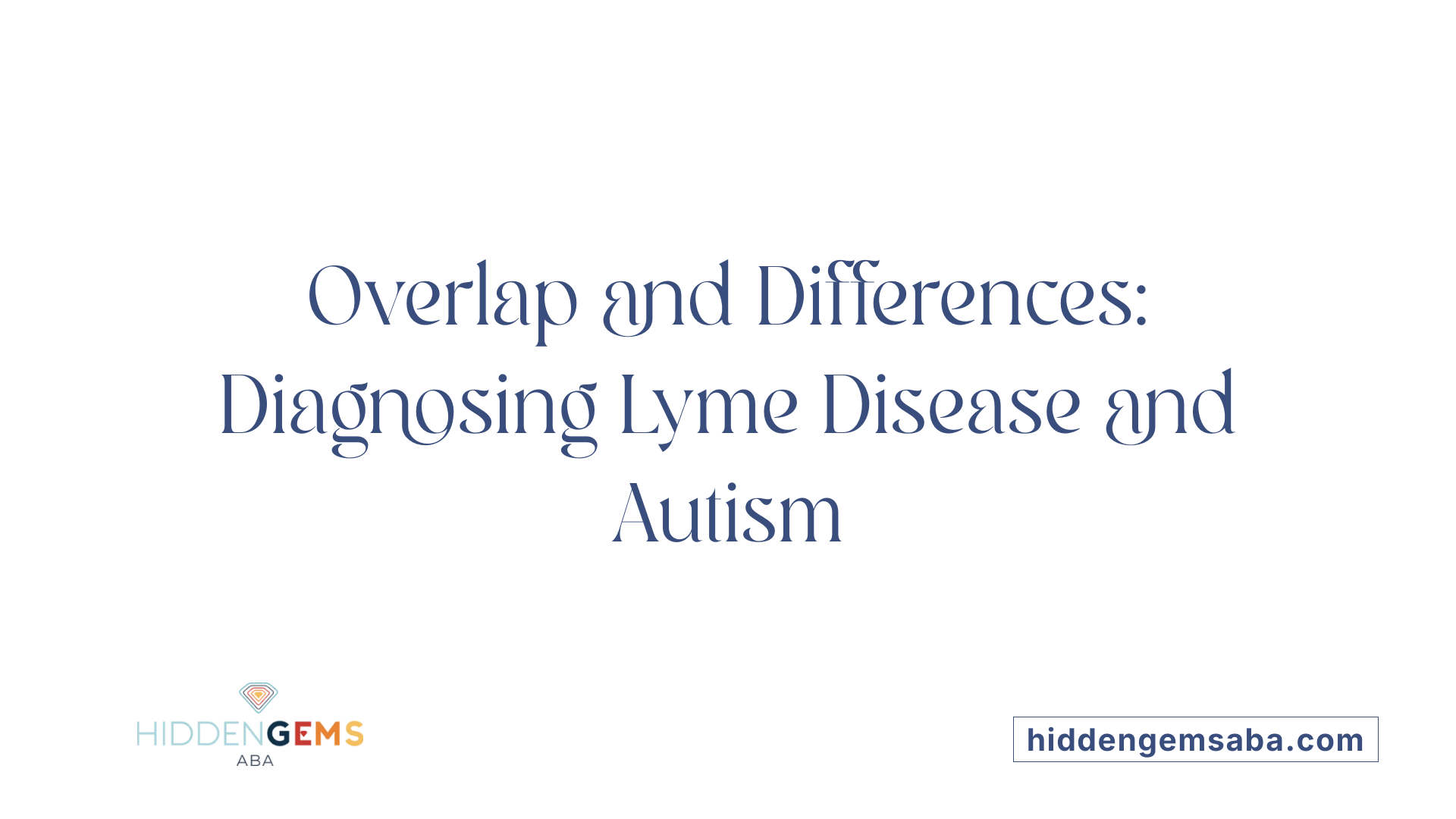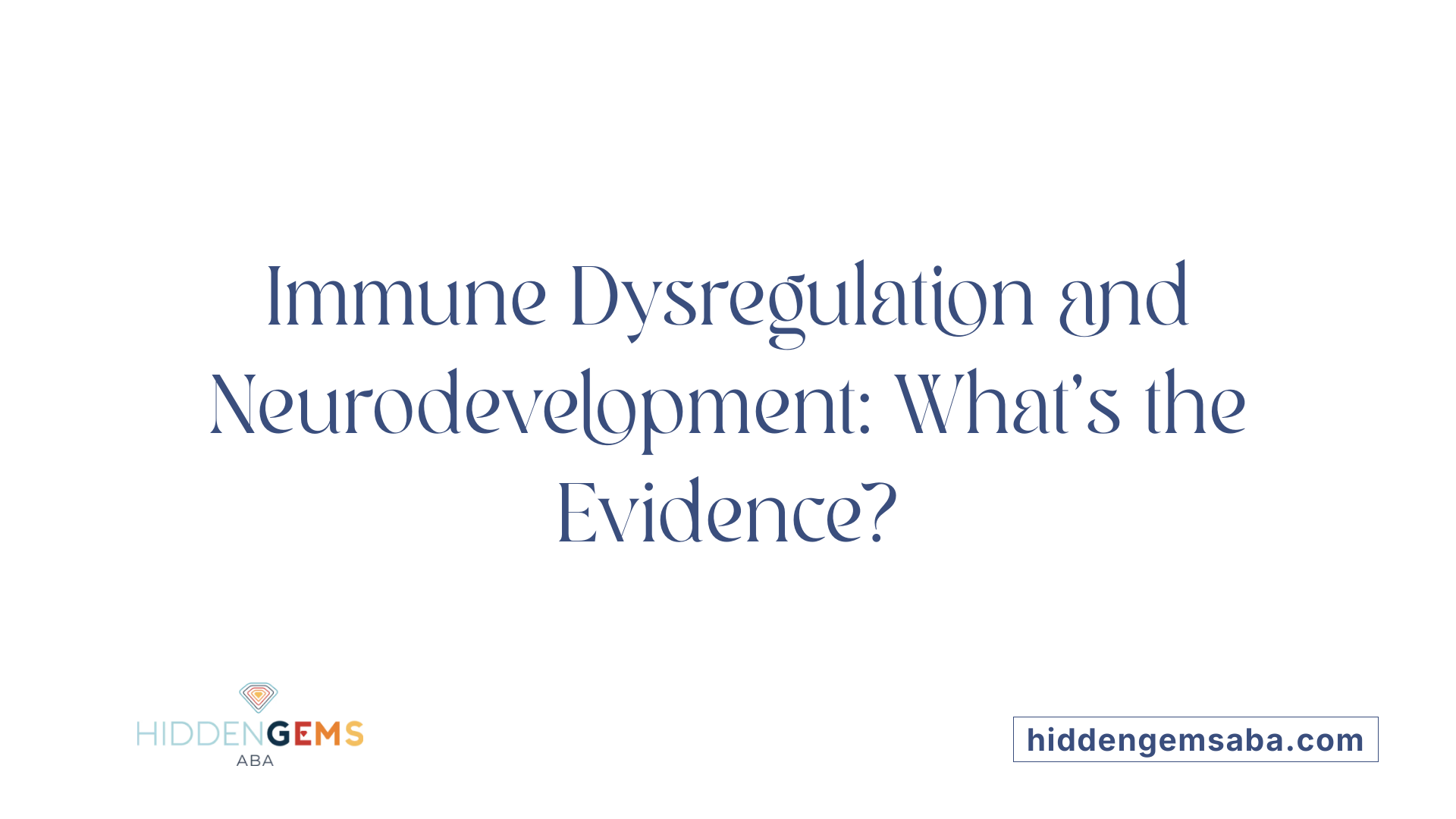Unraveling Myths and Understanding Facts
The relationship between Lyme disease and autism spectrum disorder (ASD) has been a topic of debate and speculation. While some claims suggest a connection, scientific evidence remains clear that there is no direct causal link. This article aims to explore current research, clarify misconceptions, and provide balanced insights into this complex subject.
What Does Scientific Research Say About Lyme Disease and Autism?

What does scientific research say about the potential link between Lyme disease and autism?
Extensive research has examined whether Lyme disease could be related to autism spectrum disorder (ASD). Recent, well-designed studies show there is no evidence supporting a connection.
One significant study analyzed serum samples from 120 children with autism and 50 unaffected controls. These samples were tested using the CDC-recommended 2-tier testing algorithm, which includes an ELISA test followed by a Western blot. This method is considered the standard for diagnosing Lyme disease.
The results showed that none of the children with autism or the control group had serological evidence of Lyme infection. The statistical analysis indicated a 95% confidence interval for seroprevalence between 0% and 5.1%, strongly suggesting no increased rate of Lyme disease antibodies among children with autism.
Additional research also reveals that claims of high Lyme disease seropositivity in autistic children are questionable. Many past reports rely on unpublished data or tests with non-standard criteria, which could lead to false positives. Furthermore, laboratory tests for Lyme are not always accurate in identifying active infection, as positive results could reflect past exposure or false alarms.
Overall, the consensus from the scientific community, including major organizations like the NIH and Autism Science Foundation, is that there is no credible evidence connecting Lyme disease with autism. Current data do not support widespread testing for Lyme as a factor in ASD and emphasize the importance of accurate diagnosis based on symptoms rather than serology alone.
While some studies suggest a presence of co-infections or other infections like Mycoplasma in children with ASD, the direct link to Lyme disease remains unproven. The primary focus remains on evidence-based interventions to support children with autism, without unnecessary antibiotic treatments aimed at Lyme disease absent clear signs of infection.
Understanding these findings helps dispel myths and ensures that children receive appropriate care based on current scientific standards, not unsupported claims.
Consensus and Opinions from Health Authorities
 The current scientific consensus from major health organizations is that there is no definitive evidence linking Lyme disease directly to autism spectrum disorder (ASD). Although some studies indicate that around 25% of children with ASD show serological signs of exposure to Borrelia burgdorferi, the bacteria responsible for Lyme disease, this does not prove causation. These findings may include false positives or reflect past infections that are not actively contributing to autism symptoms.
The current scientific consensus from major health organizations is that there is no definitive evidence linking Lyme disease directly to autism spectrum disorder (ASD). Although some studies indicate that around 25% of children with ASD show serological signs of exposure to Borrelia burgdorferi, the bacteria responsible for Lyme disease, this does not prove causation. These findings may include false positives or reflect past infections that are not actively contributing to autism symptoms.
Official guidelines from authorities like the National Institutes of Health (NIH) and the Autism Science Foundation clarify that testing for Lyme disease should be based on clinical presentation rather than solely on laboratory results. While infections such as syphilis, rubella, and toxoplasmosis have well-established links to ASD, evidence connecting Lyme disease to autism remains inconclusive.
Experts emphasize that treating autistic children solely with antibiotics for Lyme disease without clear evidence of active infection can be harmful and is not supported by scientific research. The focus remains on understanding neurodevelopmental factors, immune dysregulation, and environmental influences.
Despite some hypotheses and preliminary data about shared symptoms and biochemical similarities, current clinical guidelines do not endorse routine testing or treatment for Lyme disease as a method to address autism. Instead, they advocate for comprehensive care tailored to each child's unique needs, incorporating nutritional, lifestyle, and medical strategies that promote overall health.
| Organization | Position on Lyme-ASD Link | Recommended Actions | Additional Notes |
|---|---|---|---|
| NIH | No confirmed link; testing based on symptoms | Support research, avoid unnecessary antibiotics | Focus on broader neurodevelopmental factors |
| Autism Science Foundation | No support for Lyme disease as cause of ASD | Emphasize evidence-based diagnosis and treatment | Clarifies that infections are one of many factors |
| CDC | No evidence to support routine Lyme testing for ASD | Clinical evaluation prioritized | Warns against false positives and unnecessary treatments |
In summary, while ongoing research continues to explore infections and immune factors in ASD, current health authority positions do not endorse a causal relationship between Lyme disease and autism. Further studies are needed to clarify any potential connections and appropriate interventions.
Shared Symptoms and Diagnostic Challenges

What are the similarities and differences in the symptoms, diagnosis, and treatment of Lyme disease and autism?
Lyme disease and autism are distinct conditions, each with unique characteristics, but they also share some overlapping symptoms, making diagnosis challenging. Lyme disease, caused by the tick-borne bacteria Borrelia burgdorferi, usually presents with flu-like symptoms, skin rashes such as erythema migrans, joint pain, muscle weakness, and neurological issues like brain fog or neuropathy. Its primary diagnostic tools include blood tests such as ELISA and Western blot, alongside clinical evaluations. However, these blood tests can sometimes produce false positives or indicate past, not active, infection.
Autism spectrum disorder (ASD), on the other hand, is primarily a developmental condition characterized by challenges with social communication, repetitive behaviors, restricted interests, and delays in reaching developmental milestones. Diagnosis largely depends on behavioral assessments and developmental history, not on laboratory tests.
Research shows that approximately 25% of children with ASD exhibit evidence of exposure to Borrelia burgdorferi and other co-infections like Mycoplasma, Bartonella, Ehrlichia, and Babesia, which can cause immune dysregulation, biochemical alterations, and neurological symptoms similar to Lyme disease. These infections can lead to brain inflammation, oxidative stress, decreased glutathione levels, and atypical brain imaging results, including temporal lobe abnormalities.
Treatments for Lyme disease typically involve antibiotics and addressing co-infections, while autism management includes behavioral therapies, educational interventions, and supportive therapies. Interestingly, some case studies report improvement in ASD symptoms following targeted treatment of Lyme disease and associated infections.
In summary, although Lyme disease and autism are different conditions, their overlapping symptoms and biochemical similarities suggest that infections like Lyme may sometimes contribute to or exacerbate symptoms seen in autism. Recognizing these overlaps is vital for proper diagnosis and tailored treatment strategies.
Below is a comparison table summarizing the key aspects:
| Aspect | Lyme Disease | Autism Spectrum Disorder | Overlapping Features |
|---|---|---|---|
| Cause | Bacterial infection (Borrelia burgdorferi) | Neurodevelopmental disorder | Both can involve immune dysregulation |
| Primary Symptoms | Rashes, fever, joint pain, neurological issues | Communication challenges, repetitive behaviors | Both can exhibit neurological and psychological symptoms |
| Diagnosis | Blood tests, clinical evaluation | Behavioral assessments | Both may have shared neurological signs |
| Common Co-infections | Mycoplasma, Bartonella, Babesia | — | Can have similar biochemical impacts |
| Treatment | Antibiotics, supportive therapies | Behavioral therapies, supportive care | Both can benefit from addressing infections and health optimization |
Understanding the nuanced overlap between Lyme disease and autism emphasizes the importance of comprehensive evaluation, especially when symptoms suggest infectious or immune components. Recognizing these links may open pathways for new intervention strategies and targeted therapies.
The Role of Infections and Immune Dysregulation in ASD

How might infections such as Lyme disease contribute to autism spectrum disorder?
Research indicates that chronic infectious diseases, including tick-borne illnesses like Lyme disease caused by Borrelia burgdorferi, could potentially influence neural development. While there is no definitive evidence that Lyme disease directly causes autism, some studies suggest that infections may play a role in neurodevelopmental changes.
Infections during pregnancy, especially maternal immune responses to pathogens, are of particular interest. When a mother’s immune system reacts to infections, it releases inflammatory cytokines and produces maternal antibodies that can cross the placenta. These immune factors may adversely affect the developing fetal brain, potentially increasing the risk of ASD. Such immune-mediated effects include neuroinflammation and biochemical disruptions that can influence brain wiring.
In children diagnosed with ASD, some research shows a higher prevalence of infections like Mycoplasma species and Borrelia burgdorferi. Studies report that approximately 20-30% of children with ASD test positive for Lyme bacteria, and about 58% show evidence of Mycoplasma infection. These co-infections could contribute to immune dysregulation and biochemical imbalances, which are common features observed in ASD.
Infection-related immune responses may lead to persistent inflammation and neuroinflammation, impacting brain development and possibly exacerbating behavioral symptoms. Although a direct causative link remains unproven, the association between certain infections, immune dysregulation, and ASD suggests that addressing infections could be a beneficial component of managing some symptoms.
| Infection Type | Percentage of ASD Cases Positive | Possible Effects | Additional Notes |
|---|---|---|---|
| Borrelia burgdorferi (Lyme) | 20-30% | Neuroinflammation, immune dysregulation | Often co-infected with other pathogens |
| Mycoplasma species | 58% | Immune response alterations, inflammation | Linked with neurobehavioral issues |
Understanding the role of infections and immune responses highlights the importance of thorough medical evaluation and potential treatment options, including infection management and immune modulation, tailored to individual cases.
Case Studies, Treatments, and Future Directions
What are the potential benefits of treating infections in children with autism?
Emerging research suggests that addressing underlying infections, including some tick-borne illnesses, might help improve symptoms in certain children with autism. Since infections can cause immune dysregulation, inflammation, and other biological changes, their treatment could potentially support neurological health.
Treatments such as antibiotics or herbal therapies targeted at specific infections may reduce systemic inflammation and improve related health issues like gut dysfunction or behavioral symptoms. Nutritional support and lifestyle modifications that enhance immunity and detoxification processes might also be beneficial.
Although more research is needed, some case reports indicate symptom reductions following targeted infection treatments. These findings highlight the importance of thorough medical evaluation to identify any treatable infections in children with ASD.
Are there case reports of symptom improvement after antibiotic therapy?
There are anecdotal reports and some small case studies where children with autism experienced noticeable improvements after treatment with antibiotics. These treatments aimed to eradicate infections like Borrelia burgdorferi or Mycoplasma, which have been detected in some ASD cases.
In such cases, caregivers and healthcare providers observed gains in communication, reduced behavioral outbursts, and better overall functioning. However, these reports lack large-scale scientific validation, and the benefits may vary among individuals.
It is crucial to approach antibiotic therapy cautiously, under expert supervision, and based on clear diagnostic evidence to avoid unnecessary risks.
Why is early detection and individualized treatment important?
Early detection of infections and other contributing health issues allows for timely treatment, which might prevent some neurological sequelae associated with unresolved infections.
Each child with ASD is unique, and their treatment plan should consider their specific health profile, co-occurring conditions, and risk factors. Customized approaches improve the chances of meaningful symptom improvement while minimizing potential side effects.
Consulting specialists in infectious disease, neurology, and integrative medicine can help develop safe and effective individualized treatment strategies. Ongoing research continues to explore how targeted therapies may benefit some children and shape future management practices.
| Aspect | Details | Considerations |
|---|---|---|
| Potential benefits | Symptom improvement, immune regulation | Need for individualized assessment |
| Case reports | Improvements noted post-antibiotic/herbal treatments | Not yet validated by large studies |
| Early detection | Increased chances of effective intervention | Requires comprehensive testing |
While current evidence remains limited, the promising signs from recent studies and case reports encourage further investigation into tailored treatment options for children with ASD related to infections.
Public Education and Awareness
Efforts to educate the public about health conditions must rely on accurate and scientifically supported information. Currently, there is no evidence establishing a link between Lyme disease and autism spectrum disorder (ASD). While both conditions can exhibit overlapping symptoms such as neurological, psychological, physical, and gut health issues, these are common in many health problems and do not confirm a causal relationship.
Proper diagnosis of Lyme disease involves clinical assessment and laboratory testing, like ELISA and Western blot, though these tests can sometimes produce false positives or reflect past infections. Treatment should be directed by health professionals, often involving antibiotics, herbal therapies, and nutritional strategies aimed at supporting gut health and reducing inflammation.
Public health campaigns primarily focus on prevention—such as avoiding tick bites in endemic areas—and early detection to improve outcomes of Lyme disease. These initiatives include educational programs in schools, media outreach, and community-based interventions.
It is vital that public education on Lyme disease emphasizes prevention and appropriate treatment options based on current scientific consensus, avoiding unsupported claims linking it directly to autism. Misconceptions can lead to unnecessary treatments and hinder effective management of both conditions.
In summary, raising awareness about Lyme disease should concentrate on accurate information about its transmission, symptoms, prevention strategies, and proper medical care. There is no benefit in promoting unproven hypotheses, such as the idea that Lyme disease induces autism, which are not supported by comprehensive scientific evidence.
Understanding the Facts and Moving Forward
While the possibility of infectious contributions to neurodevelopmental disorders remains an area of ongoing research, current scientific evidence does not support the idea that Lyme disease causes autism. It is essential to rely on scientifically validated information and focus on comprehensive approaches to diagnosing, treating, and preventing both conditions. Continued research into immune dysregulation, infections, and neurodevelopment will help clarify these complex interactions and improve outcomes for affected individuals.
References
- Does Lyme disease induce autism in children
- Lyme and Autism
- Serologic Markers of Lyme Disease in Children with Autism
- Is there a connection between autistic spectrum disorders ...
- Autism Spectrum Disorder and Infectious Diseases
- Is there a connection between autistic spectrum disorders ...
- Autism and Lyme Disease—Reply - PMC
- Is there a connection between autistic spectrum disorders ...
- Lyme and Autism
- A School-Based Intervention to Increase Lyme Disease ...






